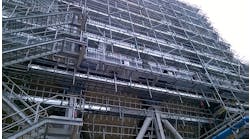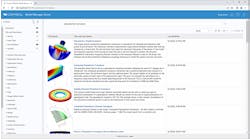The CAPE-OPEN Laboratories Network (CO-LaN) is the internationally recognised, user-driven organisation for the management of the CAPE-OPEN (CO) standards. CAPE-OPEN defines free to use and non-proprietary rules and interfaces that allow CAPE (Computer-Aided Process Engineering) applications or components to interoperate.
The primary purpose of CO-LaN is to promote the use and the development of the CAPE-OPEN standards in Computer-Aided Process Engineering (CAPE) software, and more generally to encourage all actions aimed at facilitating the use of CAPE software tools in industry, government agencies and academia. CO-LaN also helps to facilitate implementation of CO standard interfaces in commercial software to make open simulation a practical reality. CO-LaN main activities are:
1. User priorities definition for CAPE-OPEN standards: work with software vendors to clarify user priorities for process modelling software component/environment interoperability and promote use of the CAPE-OPEN standards to create commercially-valuable interoperability;
2. Exploitation and dissemination: promote the CAPE-OPEN standards to end-users and distribute CAPE-OPEN information and technology internationally;
3. CAPE-OPEN specifications life cycle management: organise the maintenance, evolution, and expansion of the specifications following user priorities;
4. Testing and interoperability facilitation: supply compliance testers to support development of components and facilitate interoperability tests between suppliers of Process Modelling Components and Process Modelling Environments;
5. Training/Migration facilitation: ensure that training modules, guidelines and tools to facilitate component wrapping are developed and are made available.
CO-LaN is a not-for-profit membership corporation. The basis of membership is a Member’s interest in the goals and values of the Society. Membership is organised in two categories: Full Members and Associate Members. Full Members are industrial users of CAPE software. Associate Members are providers of CAPE software, government agencies, academic institutions carrying out research activities in the field of CAPE, and other interested parties.
Currently CO-LaN has seven Full Members (Air Liquide, BASF, BP, DOW, Shell, IFP, TOTAL) and more than thirty Associate Members including AspenTech, Process Systems Enterprise, ProSim SA, SimSci-Esscor, HTRI, Cosmologic GmbH, InfoChem Computer Services Ltd, RSI SA, Virtual Materials Group and many others including academic institutions such as Carnegie Mellon University, RWTH-Aachen and Denmark Technical University or government agencies such as the US Environmental Protection Agency and the National Energy Technology Laboratory from the US Department Of Energy. Members are currently active through three Special Interest Groups targeted at parts of the CAPE-OPEN standards: Interoperability, Unit and Thermo. These SIGs respectively: insure that software component interoperability issues are resolved (through updating the standards or identifying component design/operation issues); support the ongoing development and expansion of the Unit (operations) standard; support the ongoing development and expansion of the Thermo(dynamics) standard.
CO-LaN maintains a website at www.colan.org that carries all the information available on the CAPE-OPEN standards. To be included in CO-LaN mailing list, just send a subscribe message to Michel Pons, CO-LaN Chief Technology Officer at [email protected].

